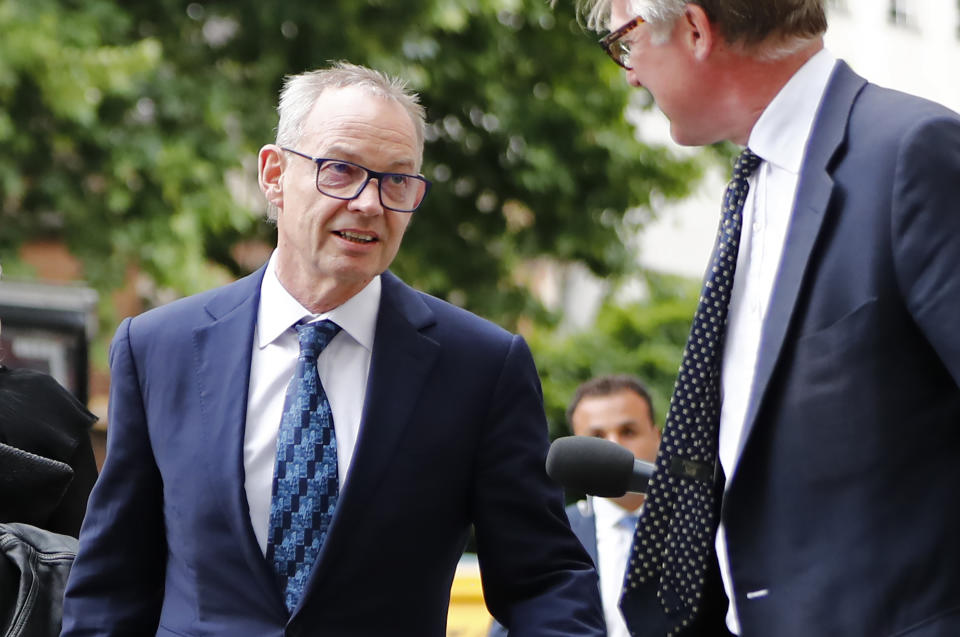Barclays lawyers signed off on ‘bungs’ and 'corrupt payments' to Qataris, court told

Internal Barclays (BARC.L) lawyers signed off on multimillion pound payments made to Qatar in 2008 that prosecutors allege were “bungs” and “corrupt payments,” a court heard on Wednesday.
Four former Barclays bankers are facing criminal charges related to a multibillion pound investment in the bank made by Qatar at the height of the financial crisis that helped Barclays avoid a state bailout. Qatar is not accused of any wrongdoing.
The defendants in the case are: John Varley, who was CEO of Barclays between 2004 and 2011; Roger Jenkins, who ran Barclays Capital’s investment management business in the Middle East and North Africa; Thomas Kalaris, the former CEO of Barclays’ wealth and investment management; and Richard Boath, the former head of European financial institutions group at Barclays Capital.
Varley and Jenkins each face two counts of conspiracy to commit fraud, and Kalaris and Boath each face one. All four defendants have pleaded not guilty. Qatar has not been accused of any wrongdoing.
The Serious Fraud Office (SFO), which is prosecuting the case, claims executives mislead the stock market by not fully disclosing fees paid to Qatar in exchange for the investment. It claims these fees were covered up by “sham” advisory service agreements (ASAs) that were just mechanisms for paying extra fees.
‘No doubt that the legal team at Barclays knew’
On Wednesday, the court was read summaries of the SFO’s interviews with two of the defendants — Kalaris and Boath — between 2014 and 2016.
Both said they repeatedly relied on reassurances from Barclays’ in-house lawyers that the arrangements with the Qataris were legal. Boath said he had raised concerns that the agreements could be seen as “bungs” or “corrupt payments” to the Qataris.
None of Barclays legal team are accused of any wrongdoing.
Kalaris told the SFO that Barclays’ senior management and legal department decided to disclose the first advisory agreement but not the amount being paid under it.
“He said that he had no doubt that the legal team at Barclays knew exactly what the first ASA was, a means of transferring what the Qataris wanted to receive for their investment by way of a separate commercially viable and legal services agreement,” Edward Brown QC, the SFO’s lead prosecutor, told the jury
Other ideas were dismissed “because of the commercial or legal rationale for the bank not stacking up,” Kalaris told the SFO.
‘The right side of the line’
Boath told the SFO: ”The bank satisfied itself that it was going to get value for those services. The bank therefore satisfied itself that it was legal. A decision was taken by people at Barclays not to disclose the fees attending to the agreement. That’s what happened.”
“I don’t think there were any lawyers working on it that didn’t know there were additional fees,” Boath said in interviews recounted by Brown.
“The issue around disclosure, materiality and all that stuff, was a matter for the lawyers,” Boath told the SFO. The lawyers ultimately concluded that the deals were “the right side of the line, legally,” he told the investigators.
Brown said Boath told the SFO he was “greatly relieved… because there had been full engagement from Group Legal.”
Boath also told the SFO that one of Barclays in-house lawyers had helped to draft a memo meant to create “an audit trail to evidence that Barclays was not paying additional fees” but said that this document “did not represent the true position” between the bank and the Qataris.
‘A corrupt payment’
The SFO also asked Boath about comments he made at the time during a phone call with one of Barclays’ in-house lawyers.
Boath said on the call: “My worry is every journalist just gets it and says this is you know… Well I hate to use the phrase…. It begins with a ‘B’.”
Boath told the SFO “the ‘B’ word was probably ‘Bung’.”
“When asked what his understanding of the meaning of the word ‘Bung’ was, Mr Boath said that it meant a corrupt payment,” Brown told the jury.
Earlier the court heard that Boath was concerned other investors “would go nuts” if they found out Barclays had done “a deal on the side or a sweetheart deal” with the Qataris.
Brown told the jury that the defendants had mislead the lawyers by saying the nature of the deal with the Qataris had changed.
“None of the defendants can honestly have thought that the lawyers had sanctioned what they (the defendants) appreciated were untrue or misleading statements,” Brown said.
The case continues and is expected to last up to six months.
Read more on the trial of the Barclays four:
Former Barclays execs lied about payments to Qatar, court told
Senior Barclays banker raised concerns about ‘hidden commission’ in Qatar deal, court told
Barclays bankers worried about ‘dodgy’ payments to Qatari Prime Minister, court hears
Bankers feared pay cuts if state had nationalised Barclays in 2008, court hears
‘Big dog’ Barclays banker paid £25m bonus for 2008 funding deal at the heart of court case

 Yahoo Finance
Yahoo Finance 